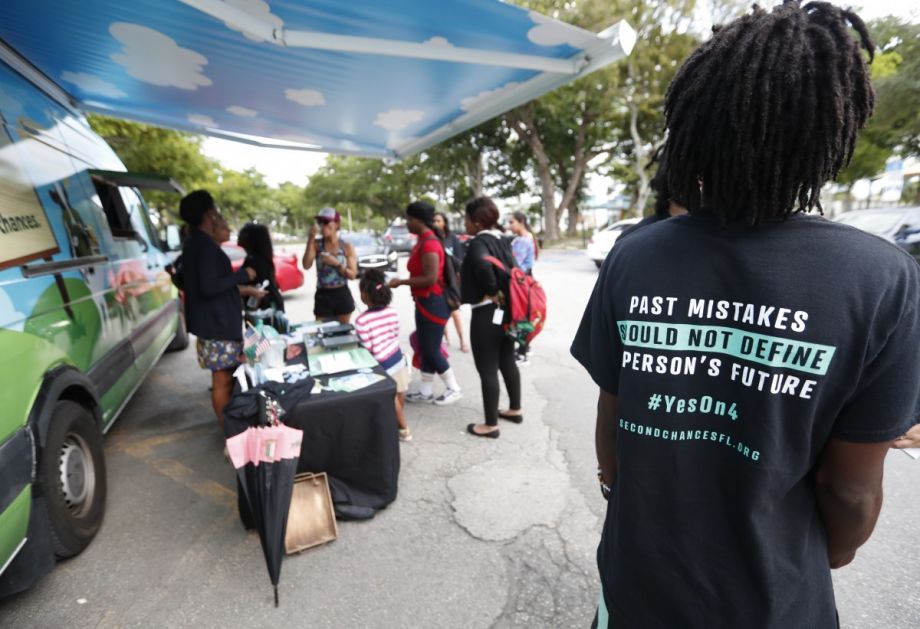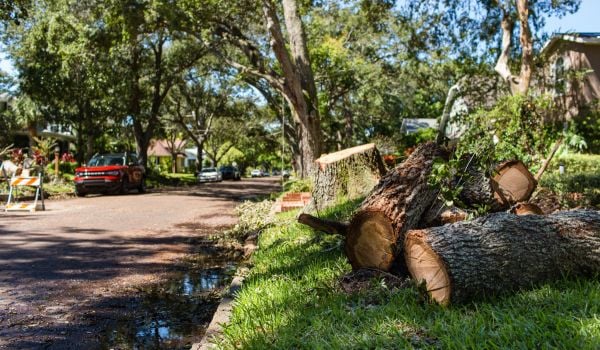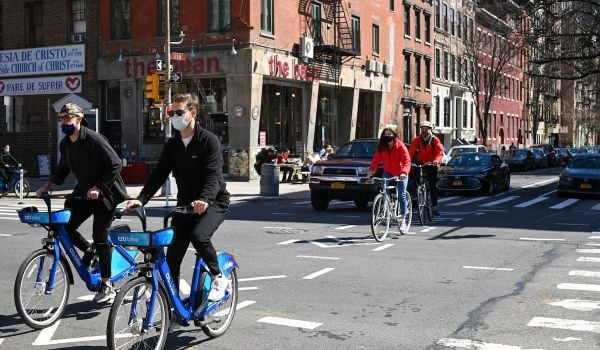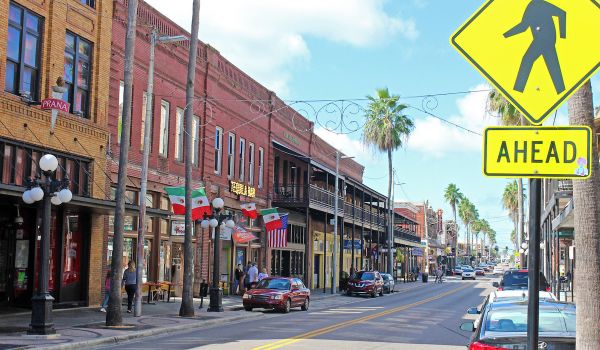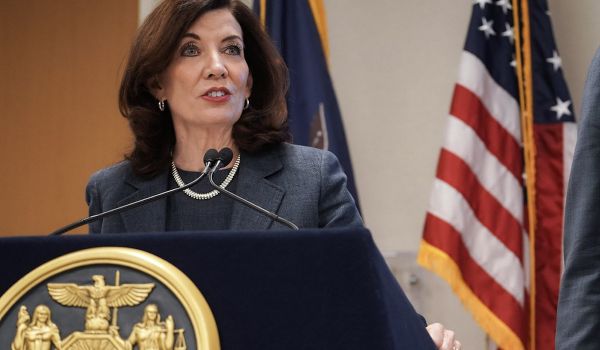Last week, Neil Volz celebrated two victories.
One was professional: As treasurer of the Florida Rights Restoration Coalition since 2015, Volz had helped lead the fight for Amendment 4, a statewide ballot referendum restoring voting rights to most people with past convictions in Florida. The amendment, which passed with 65 percent of the vote in November, took effect on Jan. 8th.
And the other was personal. In 2006, Volz, a former chief of staff to an Ohio Congressman, pleaded guilty to conspiracy in a case related to influence-peddling and bribery and the scandals surrounding lobbyist Jack Abramoff. He was sentenced in 2007 to a fine and two years’ probation. But while he was completely finished serving his sentence by 2011, under Florida law, his felony conviction made him permanently ineligible to vote. Until the law was officially changed last Tuesday.
“On the day of Jan. 8th, all those emotions just came flowing out: gratitude and appreciation and joy and the ability to be a full citizen in my community again,” Volz says. “It was pretty overwhelming.”
Until last week, Florida was one of a small handful of states that permanently stripped voting rights from anyone convicted of a felony. The state’s population of disenfranchised convicts was so large — more than 1.5 million people — that it made up more than a quarter of the total nationwide figure of 6 million people who couldn’t vote because of a past conviction, according to The Sentencing Project. And while a plain majority of returning citizens in Florida are white, like Volz, felony disenfranchisement has disproportionately hurt communities of color.
According to a report from The Advancement Project, 43 percent of returning citizens are black, two-and-a-half times greater than black residents’ share of Florida’s population as a whole. And the disparate impacts of the law were part of the point all along: As the Advancement Project report notes, felony disenfranchisement laws proliferated only after black citizens gained formal voting rights at the end of the Civil War, as part of a long string of efforts to limit black people’s participation in electoral politics.
So Amendment 4 was a milestone legal victory. And while proponents claim that the law is fully “self-executing,” registration isn’t automatic. Volz, whose organization is led by returning citizens like himself, says the group is preparing an outreach campaign to make sure people are aware of their newly restored rights.
“We really believe that how you do something matters,” Volz says. “We were committed to putting people who were directly impacted at the center of the movement and in leadership, and so those are the kind of principles that will be guiding the next steps.”
On Sunday, the Washington Post editorial board wrote that some opponents of the amendment were trying to sew confusion about how the amendment will be administered. Blair Bowie, a Skadden Foundation Fellow at the Campaign Legal Center, says that in most places in the U.S., confusion already reigns when it comes to returning citizens’ voting rights.
“One of the biggest barriers for people with past convictions is that the laws are really complicated in some places, and there’s a lot of confusion,” Bowie says. “Confusion and misinformation creates what we call de facto disenfranchisement rather than de jure disenfranchisement.”
For example, Bowie says, Nevada has a somewhat complicated matrix of limits on voting rights for people with past convictions, and the board of registrars in one county was recently requiring returning citizens to produce certain paperwork to prove that their sentences had been completed. Not only was that an unlawful requirement on the part of the registrars, Bowie says, but the paperwork that was required wasn’t even being administered to people with past convictions, creating an “insurmountable barrier” for some people who otherwise had the legal right to vote.
In Alabama, which restored voting rights to some people with felony convictions in 2017, the Campaign Legal Center has contributed to canvassing efforts for registration drives, tabled at events for returning citizens, and, most importantly, Bowie says, helped educate people who can share information about voting rights with returning citizens in their communities.
“Too frequently organizations, particularly legal organizations, will do the work to change laws and then forget about the part where they need to tell people that the law has changed and help them exact their newfound rights,” Bowie says.
Last year, advocates for returning citizens in Louisiana had a mixed record when it came to restoring voting rights. On one hand, the Louisiana Supreme Court denied a case that challenged the constitutionality of the state’s rules limiting voting rights for returning citizens. On the other, the state legislature passed a law that restores voting rights to some people with prior convictions.
Andrew Hairston is a staff attorney at the Advancement Project who worked on the court challenge on behalf of the plaintiff, VOTE, an advocacy group led by former inmates in the Louisiana State Penitentiary. Hairston says that even before the case got to the state supreme court, there were hints that a legislative challenge to the felony disenfranchisement laws might have more success than a legal one. So VOTE began organizing support for Act 636, which takes effect in March and could restore voting rights to as many as 36,000 people. All advocacy efforts for rights restoration, whether legal challenges or registration drives, are more successful when they’re led by people with prior convictions, Hairston says.
“That has been a fundamental tenet of VOTE’s operating structure and it has just paid dividends over the years,” he says.
And, Hairston says, it’s not just important to reach out to returning citizens to tell them about their restored voting rights. The Advancement Project has been talking with the Louisiana Secretary of State’s office to make sure that any materials it distributes accurately reflect changes in the law.
One criticism of efforts to restore voting rights to people with convictions is that they are partisan efforts to help Democrats; in 2016, when Virginia Governor Terry McAuliffe restored voting rights to 200,000 returning citizens, some Republicans reportedly complained that it was simply an attempt to help Hillary Clinton win the presidential election. But felony disenfranchisement laws are rooted in efforts to suppress the black vote. And Volz says that changing those laws is a matter of fundamental rights for people who’ve completed their sentences.
“We worked too long and too hard to get those rights back to simply give them away to some partisan agenda,” Volz says.

Jared Brey is Next City's housing correspondent, based in Philadelphia. He is a former staff writer at Philadelphia magazine and PlanPhilly, and his work has appeared in Columbia Journalism Review, Landscape Architecture Magazine, U.S. News & World Report, Philadelphia Weekly, and other publications.
Follow Jared .(JavaScript must be enabled to view this email address)

